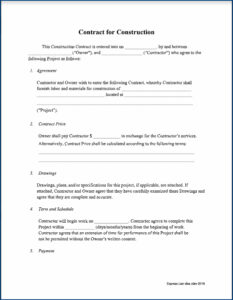
When embarking on a construction project, whether it’s a residential or commercial venture, having a well-drafted construction contract is crucial. A construction contract serves as a legally binding agreement between the owner or client and the contractor, outlining the terms and conditions of the project. This article will delve into the importance of a construction contract template, what to include in one, how to write it, and common mistakes to avoid.
What Is a Construction Contract Template?
A construction contract template is a pre-designed document that provides a structured framework for creating a construction contract. It serves as a starting point for drafting a customized contract that aligns with the specific needs and requirements of a construction project. Using a template not only saves time but also ensures that crucial aspects of the agreement are not overlooked.
Why Do You Need a Construction Contract Template?
Having a construction contract template is essential for several reasons:
- Clarity and protection: A well-drafted contract clearly defines the roles, responsibilities, and expectations of both parties involved in the construction project. It helps prevent misunderstandings and provides legal protection in case of disputes.
- Legal compliance: Construction projects are subject to various laws and regulations. A construction contract template helps ensure compliance with these laws and protects both parties from potential legal ramifications.
- Financial security: The contract outlines the payment terms, including the project cost, payment schedule, and penalties for delays or non-payment. This helps ensure that both parties are financially protected throughout the project.
- Dispute resolution: In the event of a disagreement or dispute, a well-written contract provides a clear process for resolving issues, such as mediation or arbitration.
What to Include in a Construction Contract Template?
A comprehensive construction contract template should include the following key elements:
- Project details: Provide a detailed description of the project, including its location, scope of work, and timeline.
- Contractor and client information: Include the names, addresses, and contact details of both parties involved in the contract.
- Payment terms: Clearly outline the payment schedule, including the total project cost, deposit, progress payments, and retainage.
- Scope of work: Specify the tasks and responsibilities of the contractor, including any subcontracting arrangements.
- Change orders: Outline the process for making changes to the original scope of work, including how additional costs will be handled.
- Insurance and permits: Specify the insurance requirements and necessary permits for the project.
- Warranties: Include any warranties or guarantees provided by the contractor for the completed work.
- Dispute resolution: Outline the process for resolving disputes, such as mediation, arbitration, or litigation.
How to Write a Construction Contract Template?
Writing a construction contract template requires careful attention to detail and legal considerations. Here are some steps to guide you:
- Gather project information: Collect all the necessary details about the project, including the scope of work, timeline, and budget.
- Research legal requirements: Familiarize yourself with the local laws and regulations governing construction contracts to ensure compliance.
- Use a template: Start with a construction contract template to ensure you cover all the essential elements. Customize it to fit the specific project requirements.
- Be specific and detailed: Clearly outline the obligations, responsibilities, and expectations of both parties to minimize potential disputes.
- Seek legal advice: If you’re unsure about any legal aspects or clauses, it’s advisable to consult with an attorney to ensure the contract is legally sound.
- Review and finalize: Carefully review the contract for accuracy, clarity, and completeness. Make any necessary revisions before obtaining signatures from both parties.
Mistakes to Avoid
When creating a construction contract template, it’s important to steer clear of common pitfalls. Here are some mistakes to avoid:
- Failing to be specific: Vague or ambiguous language can lead to misunderstandings and disputes. Be clear and specific when describing the project details, scope of work, and payment terms.
- Omitting important clauses: Ensure you include clauses related to insurance, permits, warranties, and dispute resolution to protect both parties.
- Ignoring local regulations: Construction projects are subject to local building codes and regulations. Failure to address these requirements in the contract can lead to legal complications.
- Not documenting changes: Any changes or modifications to the original contract should be documented through change orders to avoid confusion and disputes.
- Skipping legal review: It’s always advisable to have a legal professional review the contract to ensure compliance with local laws and address any potential legal issues.
In conclusion, a construction contract template is an invaluable tool for ensuring a smooth and successful construction project. By utilizing a template and following the guidelines provided in this article, you can create a comprehensive contract that protects both parties and minimizes the risk of disputes or legal complications.
Download: Construction Contract Template



